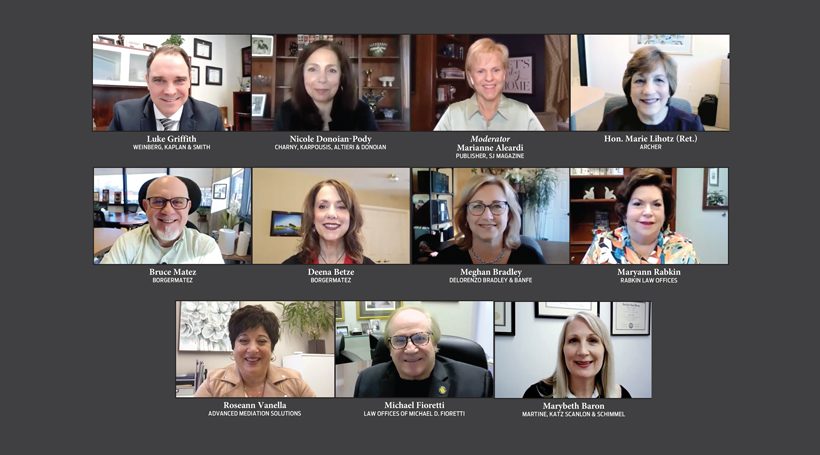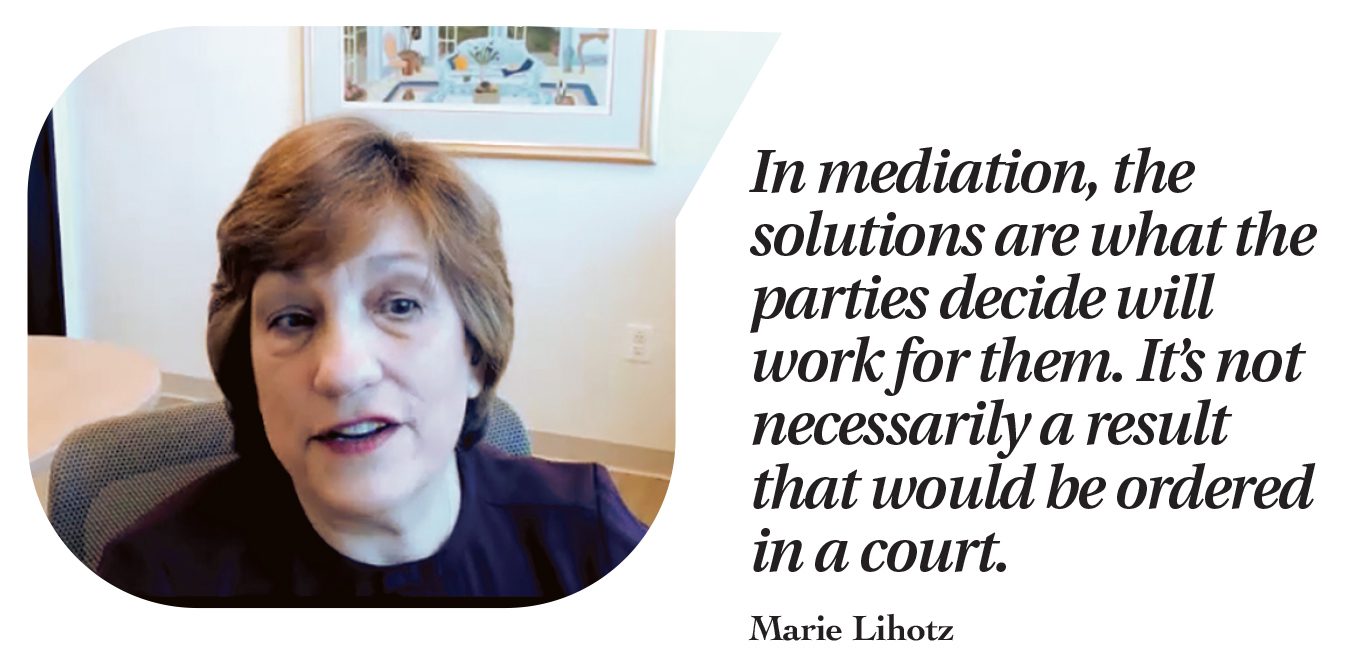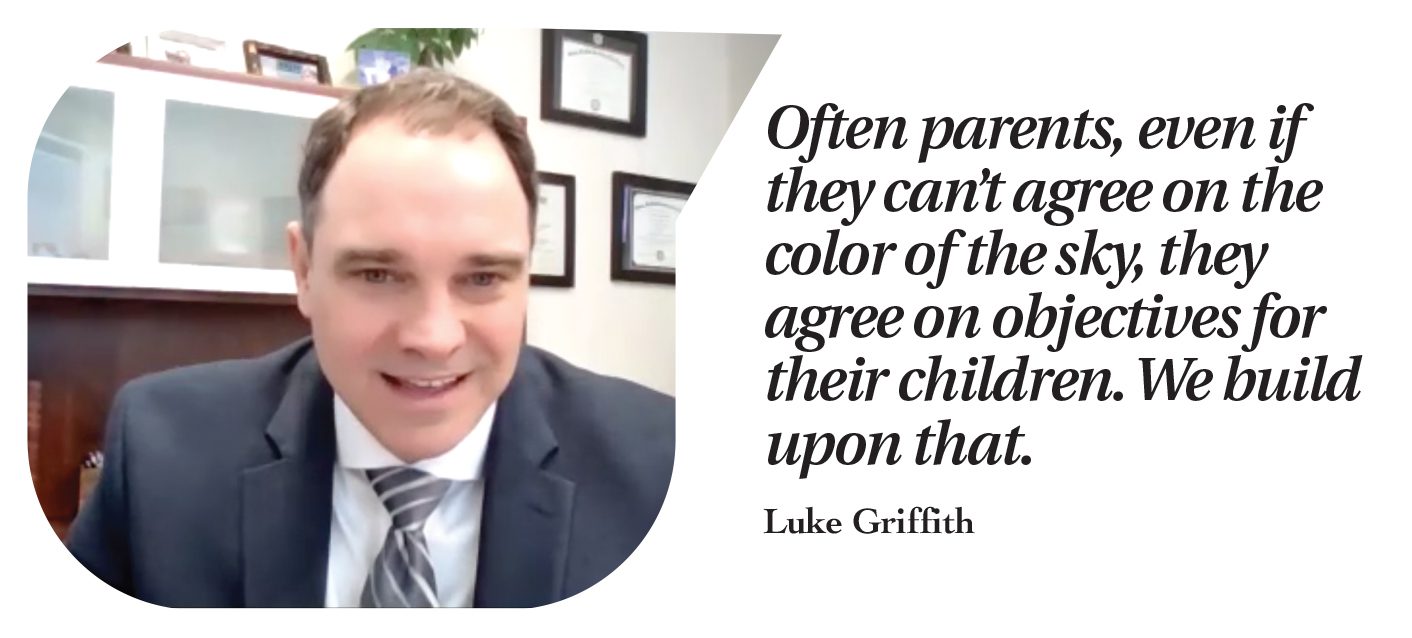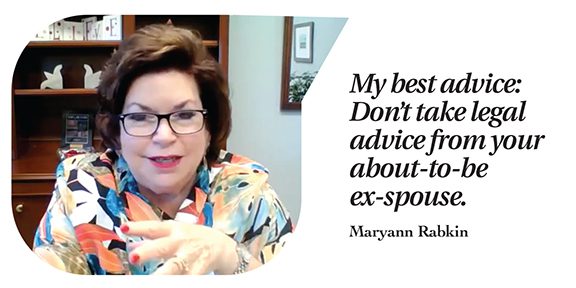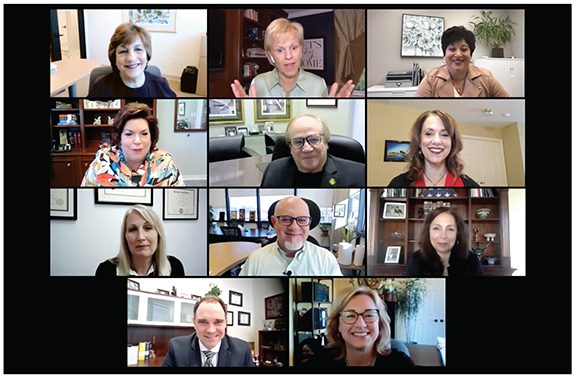Presented by

Continuing last month’s discussion about divorce during the pandemic, we spoke with experienced mediators who understand what it takes to bring 2 opposing sides to the table (or Zoom call) and reach an amicable agreement. It can be challenging, they say, but most times it is doable – and cheaper than going to court. Just a few factors make for a successful mediation, and they all agree on the first: Listening.
Participants:
Marianne Aleardi, Moderator, Publisher, SJ Magazine
Luke Griffith,Weinberg, Kaplan & Smith
Nicole Donoian-Pody, Charny, Karpousis, Altieri & Donoian
Bruce Matez, BorgerMatez
Deena Betze, BorgerMatez
Roseann Vanella, Advanced Mediation Solutions
Michael Fioretti, Law Offices of Michael D. Fioretti
Meghan Bradley, DeLorenzo Bradley & Banfe
Maryann Rabkin, Rabkin Law Offices
Marybeth Baron, Martine, Katz Scanlon & Schimmel
Hon. Marie Lihotz, (Ret.) Archer
The basics of mediation
You’re asking people to examine their positions. You’re asking them to consider the other side, because a lot of times they haven’t. You develop the middle ground because in mediation, it’s the people who come to the resolution. I don’t tell them what to do. They have to see there is a path they can follow to resolve the problem.
Marie Lihotz
The statistics on divorce say that less than 2% of cases go to trial. So if less than 2% go to trial, that means 98% or more settle. At some point they enter into an agreement. So how do they get to that agreement? Mediation is the most effective way for people to work toward an agreement or settlement.
Bruce Matez
When you get people together, what you hear is a commonality between them that they don’t even see. But it’s in that middle space where they listen to the other person. Sometimes it’s the first time they’ve actually heard what one side is proposing outside all the language that we as litigating lawyers can put around it. Mediation is really trying to get them in that middle space, where they can actually hear each other.
Maryann Rabkin
Mediators help clients come up with creative solutions that are best going to meet their personal needs, and of course, the needs of the family. We explore every possibility that could help them come to an agreement.
Roseann Vanella
In mediation, the scope of what you can do is much more flexible and much more broad. You can do things that are non-traditional. For instance, I recently had a mediation where the couple had a special needs child. They decided they would sell the house years into the future and jointly maintain the house as part of an exchange. A court probably would not have done that. They would have to sell, or there would be a buyout of the house. But this worked for this particular family.
Luke Griffith
Mediation allows couples to really talk through: When should we separate? When should we list the house for sale? Sometimes children are going through a milestone, like a child is in the middle of high school, and there are reasons to consider when the parents should separate. Mediation allows the parents to explore all the pluses and minuses, and talk out what works best for the family.
Marybeth Baron
The pandemic & mediation
People have been spending a lot of time together. That’s a problem for a lot of people. The lockdown caused husbands and wives to focus on every problem they had that they were ignoring because they were never together. So sooner or later, something’s bound to happen.
Michael Fioretti
Initially there was a real slowdown in any kind of divorce activity, because nobody knew what was going on. But just a month or 2 into lockdown, if a couple decided to move forward with a divorce, the courts were closed. So without access to the courts, mediation became one of very few options to resolve divorces during the early pandemic.
Meghan Bradley
Parents now want to work out new issues in their parenting agreement: What if there is another pandemic? What are the rules of who the children can see and not see? What about vaccinations? The pandemic brought those issues to light.
Roseann Vanella
More parents are working from home now. So before, they might not have started their parenting time until after dinner, but now they have more flexibility. And they’re saying, “I can be here for more time. I want more time.”
Nicole Donoian-Pody
Virtual Mediation
I think some people actually prefer mediation via Zoom because the husband and wife are more relaxed, and they don’t have to drive to someone’s office. They can just turn on the computer. It actually is working better than I suspected it ever would.
Marybeth Baron
I’ve had several clients who take a lunch break and sit in their car for the mediation. People find it efficient and cost effective. They’re not driving, they’re not wasting any additional time.
Meghan Bradley
You also can get access to mediators who may be farther away. If you have a case and you think a particular mediator is a good fit for that case but you don’t want to drive 2 hours, you can get them – on the computer.
Marie Lihotz
Deciding child custody
Most of the time, the kids want to spend time with both parents. They want to say what’s going to make each parent happy. So you don’t want to put a child in the position of weighing in on those serious decisions.
Meghan Bradley
Sometimes the conflict is based on a root concern: I feel like I’m not going to get enough parenting time. And really what you find is both parents have the same goal. They want their children to be happy and healthy, and in a good school system. We have the ability as mediators to talk with people about their concerns, which can help people hear that the other person isn’t trying to hurt them or take more money from them or take away their children. That usually helps people move into the middle and understand, okay, we really have some differences, but we also have common goals.
Nicole Donoian-Pody
The uncertainty relating to what parenting time will look like in a divorce often creates fear, as parents anticipate the loss of time with their children. By listening carefully to the parties, you can help them create options for workable parenting time schedules. Each family is unique, and you can create a time-sharing plan that is as flexible, or specific, as their individual situation requires. A good parenting plan often includes an agreement that if the plan needs to be revisited as their children age, the parents will return to mediation before seeking assistance of the court.
Maryann Rabkin
This is the most difficult area of mediation. We can divide assets all day long, but when you’re talking about somebody’s children, that can be difficult because of the emotions. People change their idea as to what kind of parent the other parent is when they’re going through a divorce. It is the most volatile, and the most difficult, area for us to work in. But all of the people on this panel have been able to do it, even in very difficult cases that nobody ever thought would settle. Because all of us here have the ability to bring people together.
Michael Fioretti
You want to focus on what things will look like in a year for your children, in 5 years, because we’re trying to build upon something new. Whether we like it or not, the train has left the station, and we’re moving on. The challenge is sometimes one person is ready to move on, and the other person is saying, “Wait, what happened? Why are we here?” You can’t get stuck on the why.
Luke Griffith
In mediation, parents may realize they don’t necessarily need to have all 3 kids at the same time. So say, when one child plays this sport, this parent is the one attached to that child, while the other parent is with the 2 other children. That’s not typically something a judge would order. But the parents come to realize that being a parent is the most important thing.
Marie Lihotz
We try to get parents to understand they are best equipped to decide what’s best for their kids, not somebody in a black robe who is listening to evidence and testimony. You get a lot of one-size-fits-all decisions in court.
Bruce Matez
I try to stress when we’re at an impasse that this doesn’t have to be permanent. We could try something, and come back and see how it’s going.
Deena Betze
Mediation vs. court
In litigation, an issue can cost thousands of dollars to address: letters between attorneys, phone calls between attorneys, emails between attorneys. And then if it can’t get resolved, you might need to file a motion, which costs another $5,000 or more. But if you put people in a room together, or on a Zoom call, you could resolve it in 15 minutes.
Bruce Matez
There is no relationship between what you do with a mediator and what you do at a trial. In mediation, you pay less money, and you make the decision. At a trial, you’ll pay more, and somebody else is going to make the decision.
Michael Fioretti
The typical divorce retainer for each party, if they go the traditional litigated route, is $5,000 to $7,500. That is an initial outlay before you even start. I tell folks to save that money and start a college fund for your kids. That’s a better use for those funds. From a cost perspective, 95% of the time, mediation costs much, much less than litigation.
Luke Griffith
There’s a bit of a backlog in many of the courts. If you want to be able to move quickly and inexpensively, then mediation really is your best option.
Nicole Donoian-Pody
A judge looks at what happens today and typically does not go very far into the future. But in mediation you can plan for what you know is going to happen, like maybe a Bar Mitzvah or Sweet 16. Things can be planned, where a judge would never go near that, because it’s too far into the future.
Marie Lihotz
One of the biggest differences is that this is a goal-oriented process. It’s not an adversarial process. It’s not a win/lose model, like litigation has to be. Mediation is a way to come to a peaceful resolution without having to go through that adversarial process.
Deena Betze
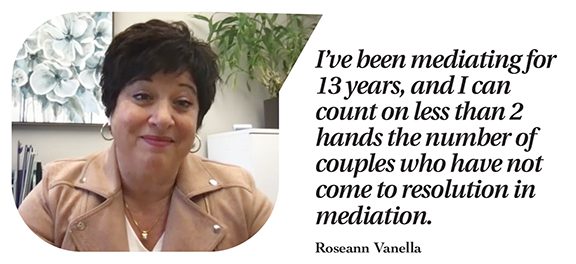
How to handle an unreasonable client
A successful mediation is teaching parties how to resolve their own disputes in a respectful way. We set the ground rules, and we have to enforce those ground rules sometimes. And sometimes you have to say, “No, you can’t talk right now.” We do have to control the discourse.
Deena Betze
There is a process called shuttle mediation, where you talk with each person individually. If one person is consistently interrupting or shutting the other person down, you do your best to reel them back in and get them to be respectful and polite, but you may have to say, “Ok, let’s take a timeout here.” And I’ll talk to the husband alone for a little bit. Then I’ll talk to the wife alone. If it’s appropriate to bring them back together, great, but sometimes it’s not. Sometimes it’s better for the mediator to shuttle back and forth between the 2.
Marybeth Baron
As a mediator, we are compassionate, but we also need to be firm. We’re in charge of the process. So there are ways to not allow someone to gaslight or disrespect the other person without being threatening. But that’s a very delicate balance that experienced mediators have.
Roseann Vanella
What surprises people about mediation
I think many people are surprised to know I’m not doing the majority of the talking in mediation. The clients are doing most of the talking. I’m asking questions, and they’re talking – hopefully to each other.
Nicole Donoian-Pody
Some people think mediation is only for “warm and fuzzy” divorces, where the issues are simple or already primarily agreed-upon. Frankly, some of the most successful mediations are those with complex and thorny issues between parties who are having difficulty communicating with each other.
Maryann Rabkin
People are surprised to know that as mediators, we don’t make decisions. We don’t tell people what to do. Our job is to facilitate discussion, make suggestions and come up with creative solutions for them. But we don’t make decisions for them.
Bruce Matez
I’ve had cases that involved family pets. The kids are close to the pets, and we talk in mediation about how to share time with them, how to share their expenses. Mediation enables you to address issues of these sorts.
Meghan Bradley
Folks sometimes come into mediation thinking the mediator will have all the answers and they won’t have to do any work. But mediation is hard work. Going through the process is hard work. It’s asking and answering a lot of questions. You have to explore why you feel a certain way, and why the other person feels the way they do. And then come to a compromise. You take steps little by little that eventually get you to a result.
Marybeth Baron
Times when mediation won’t work
Mediation is prohibited if there’s an active domestic violence restraining order. Or if you recognize a significant mental health issue or some addiction issues, those cases may not be appropriate for mediation. Also, if you recognize there is a significant imbalance of power, mediation may not be appropriate.
Bruce Matez
We were trained as lawyers to trust but verify. So if we’ve asked for documentation or given our mediation clients homework, and they’re unwilling to do that, that’s a telltale sign that something may be amiss.
Luke Griffith
Both parties have to be motivated. They have to be on the same page and want to get it done. You’ll have a very difficult time if both parties aren’t motivated.
Michael Fioretti
Mediation depends on everybody being upfront and transparent. If somebody is playing games, hiding assets or not doing what they’re supposed to do, ultimately, that will disrupt the process, and mediation just won’t work.
Deena Betze
Advice for people getting a divorce
Gather information because information is power. Gather as much as possible. Consult with a lawyer or a mediator, and maybe a mental health specialist for support. Find someone you have confidence in and a sense of comfort with, because the process is difficult. So search for information, but not necessarily on the internet.
Maryann Rabkin
Divorce has a far-reaching impact on the parties and the family. There should be a path to figure out how you can minimize the trauma to the children and maximize your financial resources. You can do that through mediation. Frankly, I don’t believe any case should be tried in family court.
Michael Fioretti
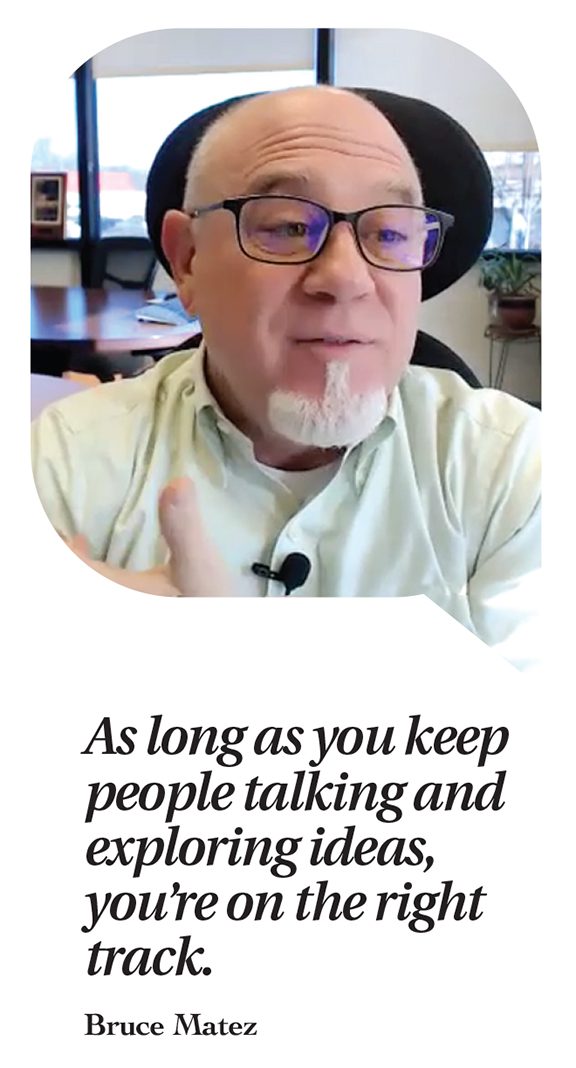
Tips for settling any dispute
The simple act of repeating what the other person just said can be extremely helpful. Many times when the other party hears how that person received what they said, they’ll clarify what they meant. When we are in heated discussions, we sometimes don’t even realize our tones or what we are saying.
Roseann Vanella
Sometimes, you just have to take 15, 10, even 5 minutes, and take a break. Then come back and talk again. In that time while people reflect, hopefully they think about what the other side said, and they’re willing to approach the problem in a different way.
Marie Lihotz
The greatest skill is listening, and that’s also the biggest challenge. The other piece is to allow there to be silence. Often people think when you’re talking through issues that there always has to be somebody talking. But sometimes it helps to let there be silence, so everybody can think.
Meghan Bradley


